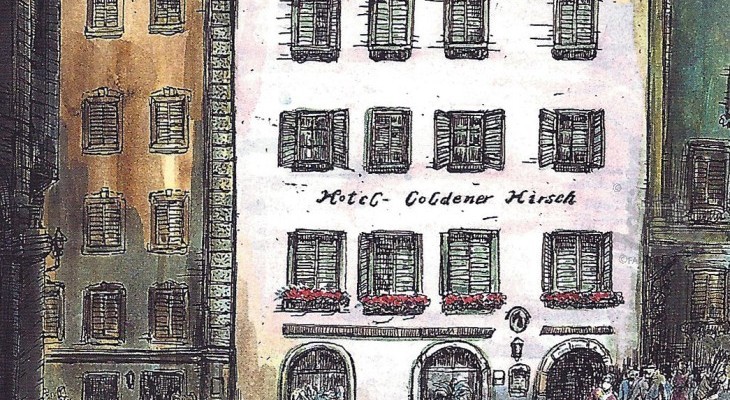
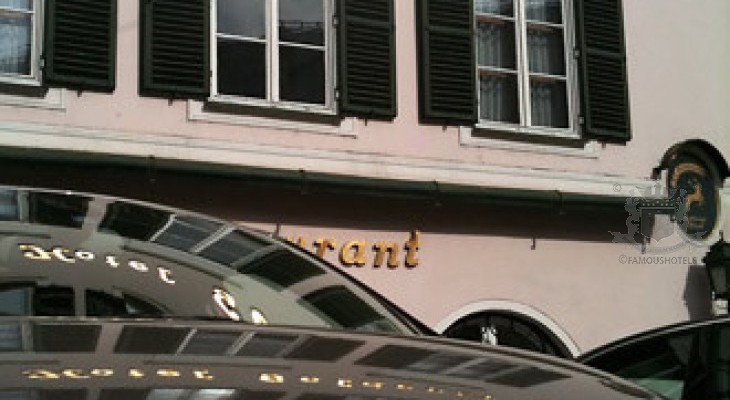
It is one of the magic places on our globe: Salzburg
Goldener Hirsch
"Jingle your golden room keys and for one blissful moment you’ll feel as if time has stood still. For six centuries the thick walls of this house have been breathing in history. In every silent corner you feel the heart of this unique hotel. It has 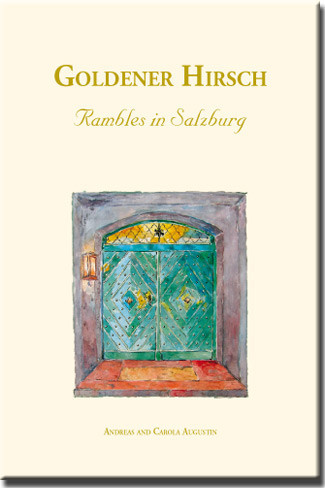 been beating steadily for hundreds of years and will surely continue to do so for many centuries to come."
been beating steadily for hundreds of years and will surely continue to do so for many centuries to come."
Andreas Augustin
Enjoy the remarkable guest list of the hotel (to the right) and see our special guide Rambles in Salzburg, produced exclusively for the hotel Goldener Hirsch: here.
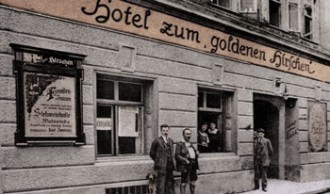
Goldener Hirsch around 1919
The facades of the old building - dating back to the 15 century - have been kept simple and unobtrusive. Understatement to the outside, luxury only behind the bulky old door. The Goldener Hirsch is just completely different from all the other world-class hotels, of which it is one. Very unusual was the rise of the hotel when it was re-opened after World War 2 in 1948 by the Walderdorff family. Harriet Walderdorff made her dream, to be hostess of the international society, come true in an unconventional way. Of course the building was furnished with functional and modern sanitary equipment, but the furniture is antique and had been collected with persistence and connoisseurship by Countess Walderdorff, who had foreseen a trend to be popular only 30 years later; countryhouse - Salzburg style. All rooms are furnished differently.

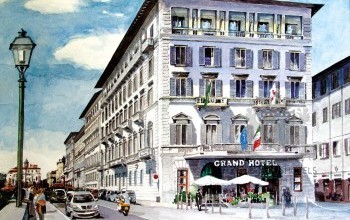
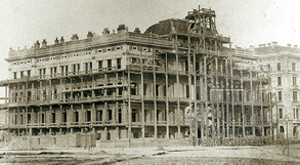
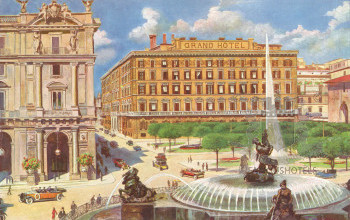
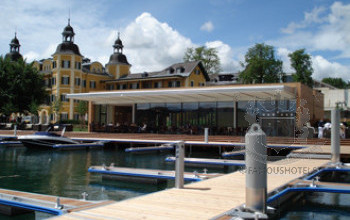
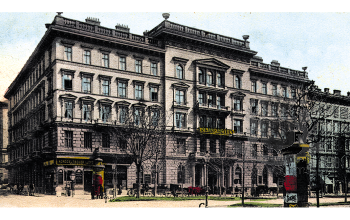
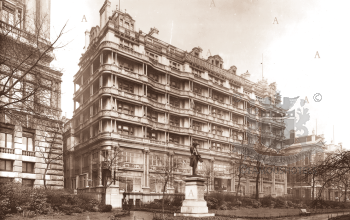
How the Stage was set
HISTORY IN BRIEF
1407 An inn at the location of the Goldener Hirsch is mentioned for the first time.
1671 The house 256, today Getreidegasse 37, is for the first time referred to as “Wirtshaus (Inn) Zum Güldenen Hirschen”
1947 The hotel has a major post-war refurbishment.
1997 The hotel becomes a select member of The Most Famous Hotels in the World.
Harriet Walderdorff buys and shapes the hotel in the 1940s.
HISTORY IN DETAIL
1407 An inn at the location of the Goldener Hirsch is mentioned for the first time.
1499 Salzburg has about 5,000 inhabitants. The post coach links Vienna and Brussels.
1553 The plague hits Salzburg 1564 Güldener Hirsch mentioned for the first time. 1587 Wolf Dietrich Archbishop of Salzburg. 1596 Caspar Beichtner buys house No. 256, Getreidegasse 37, the “Güldener Hirsch” and becomes the first fully licensed innkeeper. 1614 Laying of the foundation stone of the cathedral. 1616 May be the first performance of an opera at the Hellbrunner Steintheater. 1644 95 breweries in Salzburg. Approx. 9.000 inhabitants. 1657 Smoking of tobacco is banned from the city. 1668 The first newspaper appears in Salzburg 1669–1680 Wilderich von Walderdorff is Prince Bishop of Vienna. 500 years later a descendant of his house will take over the Goldener Hirsch. 1671 The house 256, today Getreidegasse 37, is for the first time referred to as “Wirtshaus (Inn) Zum Güldenen Hirschen” 1696 The Pferdeschwemme, a washing alley for horses, is built opposite of the Goldener Hirsch. 1705 The first coffee house, the Steigersche Kaffeehaus, today Café Tomaselli, is opened. 1751 Maria Anna Mozart, nicknamed Nannerl, 4. Child of the Mozart family sees the light of the world. 1752 The mail-coach links Salzburg and Linz. Jan 27, 1756 Wolfgang Amadeus Mozart, is born as the 7th and last child of Leopold and Anna Mozart. Father Leopold is a well-known violin player, vice conductor of the Salzburger Hofkapelle, music teacher and author of a violin school (still in use today!) W.A.Mozart was actually baptised Johannes Chrysostomus Wolfgangus Theophilus (Gottlieb in Greek).
In 1770 he starts calling himself Wolfgango Amadeo (Gottlieb, in Latin) and after 1777 Wolfgang Amadé. 1764-67 The tunnel between the place in front of the Goldener Hirsch and the other side of the mountain Mönchsberg is completed. 1767 The rank of count is conferred upon the Walderdorff family. 1773 Salzburg has about 16.000 inhabitants. 1788 The mail coach links Salzburg and Triest at the northern Adriatic coast. 1791 On December 5th Wolfgang Amadeus Mozart dies in Vienna. 1792 Birth of Josef Mohr, the author of Silent Night, Holy Night. Dec 15 1800 French Troops occupy Salzburg. 1805 Treaty of Bratislava brings Salzburg to Austria. 1809 French occupation of Salzburg and parts of Austria. Austrian defeats Napoleon on May 22nd at Aspern near Vienna, later Austrian defeat at Wagram. May 1 1816 Salzburg finally part of Austria. Dec 12 1818 First performance of Silent Night, Holy Night at the church of Oberndorf near Salzburg. 1842 Salzburg honours its great son Mozart with a statue (Mozartdenkmal). 1848/49 Revolution all over Europe. Emperor Ferdinand abdicates. The new emperor is Franz Josef I. 1858 Railway “Kaiserin-Elisabeth-Westbahn” links Vienna with Linz. Aug 1 1860 the railway track Linz – Salzburg completed. Salzburg’s streets are gas-lit. 1862 The city gets a public sewage system. 1873 Numbering of houses changes to the Paris system. All roads bear names now and houses are numbered. Goldener Hirsch changes from number 256 to Getreidegasse 37 and – on the other side - to Heuwag- or Sigmundsplatz 5. 1877 First telephone in Salzburg. The main bridge receives iron reinforcement. 1878 Electric light for the first time used in a private household. 1880 The house were Mozart was born becomes a public museum. The music academy “Mozarteum” opens. 1884 25.529 inhabitants in Salzburg. The owner of the Goldener Hirschen, Carl Murauer, builds a bowling alley at the hotel. 1889 Electric chandeliers at the main dining hall of the Goldener Hirsch. 1890 Electric elevator to the Mönchsberg is completed. 1904 Hermann Bahr and Max Reinhardt have plans for a Salzburg Festival. Apr 5 1908 Herbert Karajan is born. 1909 Albert Einstein presents his theory of relativity in Salzburg. 1914 World War I. 1916 Emperor Franz Josef dies. 1917 Foundation of the “Salzburg Festival Association” in Vienna. 1918 Karl Zwerenz announces as the new owner of the Goldener Hirsch: Rooms, cold and warm dishes at the restaurant at any time of the day, Wine-hall (standing only) and excellent beers. Nov 11 1918 End of World War I. Emperor Karl abdicates. Collapse of the 51-million people monarchy. On November 12th the Republic is announced. Sep 10 1919 Treaty of St. Germain.
1931 Room rates at the Goldener Hirschen: (total of 70 rooms): Single room: 2,50 – 4 Schilling; high season: 3–8 Schilling. Half board 8–10 Schilling (low season), 12-14 during festival seasons. Lunch from 2,50 Schilling, bathroom an extra 2,50, while heating was always included. 1934 Population of Salzburg is 69.447. 1936 Soprano Lotte Lehmann, a guest at the Villa Trapp, discovers the talent of the singing Trapp family. The Trapps who have lost most of their fortune due to a bank collapse, start their career as a family choir. Aug 1938 The Goldener Hirsch has the telephone number 419, a single room is 4–8 Schilling, a double 8–20, half board 12–16, a breakfast 1,50–2, bathroom 2,50. Apr 14 1939 Austria annexed by Nazi Germany – becomes the Ostmark, Salzburg a Reichsgau.
In September, World War II. starts.
Okt 13 1939 Emanuel Graf Walderdorff buys the Goldener Hirschen.
Aug 1940 Franz and Anna Bernauer lease the hotel from Walderdorffs. Okt 16 1944 Start of US air raids over Salzburg to liberate Austria and to end World War II. May 4/5 1945 City handed over to American troops.
July 6 1946 Count Emanuel Walderdorff applies for major renovations of the old building.
1946–47 Goldener Hirsch as well as all other major hotels becomes temporary home of ex KZ inhabitants.
Jan 2 1947 Renovation of Goldener Hirsch to start.
1948 In April the Goldener Hirsch reopens after extensive renovations.
1949 Maria Augusta Trapp’s book “The Story of the Trapp Family Singers” appears in America.
1955 The restaurant of the hotel is on tour: Goldener Hirsch Chef Fritz Lanik produces Spiesschen Goldener Hirsch, Wiener Backhendl and Sachertorte at the Horecafe in Amsterdam.
May 1963 Starts the shooting to “Sound of Music” in Salzburg. Mar 2 1965 The opening of the movie “Sound of Music” at New York’s Rivoli Theatre attracts more people to Salzburg than any other event before and ever since.
1967 Herbert von Karajan starts the festival at Easter. 1968 Baroque composer Emilio De’Cavalieri (¦ 1550 – 1602) rediscovered at the festival. Reason enough for the Walderdorffs to name a house cocktail after him.
1969 Queen Elisabeth II., Prince Philip and Princess Anne visit Salzburg. The Goldener Hirsch caters for the gala dinner.
Feb 9 1970 Carl Adolf Vogel buys the Goldener Hirsch. Johannes Count Walderdorff remains the general manager of the hotel. 1971 Population of Salzburg at 128.845. 1972 Richard Nixon visits the Goldener Hirsch. 1987 Kupferschmiedhaus annex opposite of the hotel in Getreidegasse inaugurated. Okt 1993 Condé Nast Traveller the hotel under Top Foreign Hotels as 16th) (1. PENHGK, 2. OMBKK, 3. REGHGK)
1993 Winter: GOH goes New York. Metropolitan ticket holders enjoy after the show at the restaurant The Grand Tier at 54 Dollars Rehrücken mit Rotkraut und Serviettenknödel.
1994 Sisterhotel Imperial in Vienna ranked the best hotel in the world by Condé Nast Traveller.
1995 Population of Salzburg at 146.663.
Okt 18 1996 The library “Bibliothek”, a conference venue at the hotel, opened.
1997 Smart rooms concept including fax, modem and office facilities.
1997 Conference room built at the hotel. The Goldener Hirsch becomes a select member of The Most Famous Hotels in the World.
Jul 8-11 1997 2. World Economic Forum with 11 heads of states, 75 ministers and over 500 participants, representing 45 countries, meet in Salzburg. The Goldener Hirsch caters for the dinner for 800 guests.
2000 The Goldener Hirsch under the management of Count Johannes von Walderdorff starts into the next millennium.
2005 Herbet Pöcklhofer takes over from Walderdorff and manages the hotel.
2009 Gerald Kirschek takes over from Pöcklhofer as General Manager.
2011 Wolfgang Putz takes over from Gerald Krischek as General Manager
2018 The hotel is closed for renovation
The author assumes that practically all the important members of the international aristocracy have come to the Goldener Hirsch at one time or another over the years. It would have gone beyond the scope of this listing to name them all. Therefore, this work only includes those whose art is of particular interest to the reader and who have made the Goldener Hirsch a regular place of refuge from their work. For the same reason most political figures have not been included.
Abbado Claudio
Abbado Michelangelo
Adorf Mario
Aga Khan Amyn
Aga Khan Begum Inaara
Agnelli Giovanni
Albers Hans
Albert & Paola von Belgien
Alma Seidler
Ambesser Axel von
Anda Géza
Andergast Maria
Andrea Volkmar
Andrews Julie
Angeli Pier
Anouilh Jean Marie
Antel Franz
Aslan Raoul
Austen Howard
Baarova Lida
Backhaus Wilhelm
Balanchine Georg
Balser Evelyn
Balser Ewald
Baltsa Agnes
Barber Samuel
Barenboim Sir Daniel
Barnard Christian
Bassermann Albert
Bastianini Ettore
Baumgartner Rudolf
Baxter Anne
Bayer Veronika
Bayr Rudolf
Beer Sidney
Benatzky Ralf
Benrath Martin
Berger Helmut
Bergman Ingrid
Bergner Elisabeth
Bernstein Leonard
Berry Walter
Beutler Maja
Bhumibol & Sirikit von Thailand
Bing Sir Rudolf
Birgel Willi
Blackwood Michael & Christian
Bohlen und Halbach Henriette von
Böhm Karl
Böhm Karl-Heinz
Böhme Kurt
Bollmann Hannelore
Bondy Luc
Boskovsky Willi
Boulez Pierre
Brandauer Klaus Maria
Braun Felix
Braun Wernher von
Breuer Siegfried
Brice Pierre
Britten Benjamin
Brynner Yul
Buchholz Horst
Bumbry Grace
Burda Franz & Bettina
Burton Richard
Busch Fritz
Busse Peter
Buzek Jerzy Karol
Caballé Montserrat
Cappuccilli Piero
Caroline von Monaco
Carreras Jose
Carsten Peter
Cebotari Maria
César
Chailly Riccardo
Chamberlain Richard
Charell Erik
Charles Prince of Wales
Chia Sandro
Christoff Boris
Coelho Paulo
Colbert Claudette
Constantine von Griechenland
Corelli Franco
Corena Fernando
Coreth Ferdinand & Helga
Cortese Valentina
Cotrubas Ileana
Crespin Régine
Croyx de Catherine
Curtis Tony
Czerwenka Oskar
Czinner Paul
Dahlberg Monica
Davidoff Zino
De la Renta Oscar
De Sabata Victor
Degischer Vilma
Dekova Victor
Denker Henry
Dermota Anton
Desney Ivan
Deutsch Ernst
Disney Walt
Ditto Beth
Dohnany Christoph von
Domingo Placido
Donath Helen
Doráti Antal
Douglas Kirk
DuPont Michael, Felix, Katherina
Duzar Zsoka
Ehrenfreund Heinz
Eidlitz Karl
Einem Gottfried von
Einkmann L. Richard
Elizabeth II. von England
Elisabeth von Belgien
Embiricos George
Ernst-August Prinz von Hannover
Ewert Renate
Eyck Peter van
Faggioni Piero
Fairbanks Sir Douglas
Farrell Suzanne
Feldmann Charles K.
Fellerer Max
Fielding Temple
Figl Leopold
Fischbacher Siegfried (Siegfried & Roy)
Fischer Edwin
Fischer Heinz
Fischer Kai
Flick Mick
Flimm Jürgen
Flora Paul
Fontaine Joan
Ford Glenn
Forrester Maureen
Forst Willy
Forster Rudolf
Fournier Pierre
Franckenstein Georg Albert
Franz Uta
Freni Mirella
Frey Erik
Friederike von Griechenland
Friesay Ferenc
Friml Rudolf
Fröbe Gert
Fuchs Ernst
Fuchs Margherita
Fuchsberger Joachim
Fürstenberg Ira von
Furtwängler Wilhelm
Gable Clark
Gassner Ferdinand
Gavazzeni Gianandrea
Gedda Nicolai
Gencer Leyla
Gerhard-Dahlke Elfe
Gessner Adrienne
Getty Paul & Talitha
Ghiaurov Nicolai
Giehse Therese
Giergev Valery
Gilels Emil
Gina von Liechtenstein
Ginzkey Franz Karl
Giradelli Marc
Glück Wolfgang
Gobbi Tito
Gobert Boy
Goddard Paulette
Gold Käthe
Goldschmidt-Rothschild Veronica
Golowine Serge
Goltz Christel
Gontard Gert von
Gottschalk Thomas
Graf Herbert
Gray Nadia
Grazia Patricia Fürstin von Monaco
Greene Graham
Gretler Heinrich
Grist Reri
Güden Hilde
Gulda Friedrich
Günther Jutta & Isa
Haas Waltraud
Hächter Kurt
Haeussermann Ernst
Hallstein Ingeborg
Hampe Michael
Hampson Thomas
Handke Peter
Harell Marte
Harewood Earl of George Lascelles
Harnoncourt Nicolaus
Harrer Heinrich
Hartmann Rudolf
Hass Hans
Hasse O.(tto) E.(duard)
Hatheyer Heidemarie
Hauff Angelika
Hayes Getty
Hecher Traudl
Heesters Nicole
Heidsieck Éric
Helm Brigitte
Herberstein-Thurn Nora
Hindemith Paul & Gertrud
Hochwälder Fritz
Hofmannsthal Hugo von
Hohenlohe Ursula von
Hohenzollern Friedrich Leopold Prinz von
Holm Renate
Holm Richard
Holt Hans
Holt Marianne
Holtzermann Jenny
Holtzmann Thomas
Holzmeister Clemens
Homolka Oskar
Hoppe Benedikt
Hoppe Marianne
Hörbiger Attila
Hörbiger Christiane
Horney Brigitte
Horney Karen
Hoven Adrian
Howard Jean
Hubschmid Paul
Hudson Rock
Imhoff Fritz
Innocenti Gabriela
Ionesco Eugene
Jacobsen Detlef
Jagger Bianca
Jannsen Walter
Janowith Gundula
Jaray Hans
Jeritza Maria
Jonasson Andrea
Jooss Kurt
Jürgens Curd
Jurinac Sena
Kainz Leopold
Karajan Herbert von & Eliette
Karl Gustav & Silvia von Schweden
Karlweis Oskar
Kehlmann Daniel
Keller Marthe
Kelly Gene
Kerbler Eva
Kilmer Val Edward
Kindler Kaus
King Billie Jean
King James
Kingsley Ben
Kinsky Nastassia
Kinz Franziska
Kirchner Doris
Klecki Paul
Kleiber Carlos
Kleiber Erich
Klestil Thomas
Klett Cramer
Klien Walter
Knappertsbusch Hans
Knef Hildegard
Kniepert Erni
Knittel John
Knuth Gustav
Koch Marianne
Köhler Horst
Kokoschka Oskar
Koller Dagmar
Konradi Inge
Konstantin II von Griechenland
Konstantin Prinz von Bayern
Kortner Fritz
Kotrubas Ileana
Kowa-Tanaka de Michiko
Kraus Alfredo
Krauss Clemens
Krauss Werner
Kremer Gidon
Krips Josef
Krug Remy
Krüger Franz Otto
Kubelik Rafael
Kunz Erich
Lamarr Hedy
Lancaster Burt
Laughton Charles
Lawrence Jane
Leander Zarah
Lehmann Lotte
Leigh Janet
Lemmon Jack & Felicia Farr
Leopold von Belgien, Lilian, Alexander
Lernet-Holenia Alexander
Leuwerik Ruth
Leven Boris
Levine James
Liebermann Rolf
Lindgren Astrid
Lindtberg Leopold & Valeska
Lingen Theo
Lipp Wilma
Litvak Anatole
Lobasa Monique
Loewe Frederick
Lohner Helmut
Lohse Madeleine
London George
Lorenz Max & Lotte
Lothar Ernst
Low Bruce
Ludwig Christa
Lüpertz Markus
Maazel Lorin
Madeira Jean & Francis
Maglioli Umberto
Mangold Erni
Mann Thomas, Erika, Katja
Marischka Ernst
Markevitch Igor
Martin Ross
Martini Louise
Marton Andrew
Maslennikov Alexei
Mason James
Massary Fritzi
Mattoni André
Matz Johanna
Mayerhofer Elfie
Mayr-Mellnhof
Meisel Kurt
Melcherl Helmut
Melles Sunnyi
Menasse Robert
Menotti Gian Carlo
Menuhin Yehudi
Messner Joseph
Metha Zubin
Metternich-Winneburg Tatjana von
Meyerinck Hubert von
Milstein Nathan
Mitropoulos Dimitri
Moissi Alexander
Moll Kurt
Möller Ralf
Monaco Mario Del
Moneim Muhammad Abdel von Ägypten
Montgomery Robert
Moore John
Moore Roger
Mortier Gérard
Mozart F X Wolfgang
Munch Charles
Muti Riccardo
Mutter Anne-Sophie
Neher Kaspar
Nelson Portia
Netrebko Anna
Newton Helmut
Nicolaus Peter
Nicolescu Marjana
Nicoletti Susi
Nixon Richard
Noel Evangeline
Norman Jessye
Novak Kim
Ntare V. Ndizeye von Burundi
Oberon Merle
Oestergaard Heinz
Ondra Anny
Opel Adolf
Orff Carl
Ormandy Eugene
Ozawa Sejci
Pacha Hussein Sabry
Pacha Mohammed Taher
Pahlavi Reza, Schah von Persien
Palmer Lilli & Carlos Thompson
Parma Robert
Paumgartner Bernhard
Pavarotti Luciano
Pignatari Francicso „Baby“
Pinelli Aldo von
Pinza Ezio
Platte Rudolf
Plummer Christopher
Podhajsky Alois
Poell Alfred
Pollini Maurizio
Pommer Eric
Ponnelle Jean-Pierre
Ponte Jurge
Ponto Erich
Popper Sir Karl
Power Tyrone
Pravda Christian
Prey Hermann
Price Leontyne
Pulver Liselotte
Quadflieg Will
Qualtinger Helmut
Ramey Samuel
Raudaschl Roswitha
Reincke Heinz
Reinhardt Max
Remarque Erich Maria
Renaud Madeleine
Rennert Günther
Reyer Walther
Richter Hans
Richter Karl
Richter Paul
Richter Svjatoslav
Riedmann Gerhard
Riess Kurt
Ritz Charles
Robbins Jerome
Rochas Hélène
Röder Eva
Rökk Marika
Roller Alfred
Rossellini Roberto
Rossi Drago Eleonore
Rothenberger Anneliese
Rothschild Eric de
Rothschild Louis
Rubinstein Arthur
Rudolf Leopold
Rudolf Steinböck
Rushdie Salman
Saad Margit
Sabatiere Piere
Sachs Gunther
Sartre Jean-Paul
Sawallisch Wolfgang & Mathilde
Sayn-Wittgenstein Marianne „Manni“
Schade Michael
Schalk Franz
Schaumburg-Lippe Max & Helga-Lee
Scheel Walter
Schell Maria
Schell Maximilian
Schmeeling Max
Schmid Aglaja
Schneider Magda
Schneider Othmar
Schneider Romy
Schneiderhan Wolfgang
Schneider-Siemssen Günther
Schock Rudolf
Schöffler Paul
Schönborn-Wiesentheid Karl
Schönburg-Waldenburg Pauline von
Schöpf Egon
Schreier Peter
Schroeder Ernst
Schuh Oscar Fritz
Schuh Oskar Fritz
Schulhof Andrew
Schuschnigg Kurt
Schwarzenegger Arnold
Schwarzkopf Elisabeth
Schwengeler Arnold
Sciutti Graziella
Seefrid Irmgard
Seemann Carl
Seidler Alma
Sellars Peter
Sellner Gustav Rudolf
Serenyi Prinzessin Leopoldine
Seyferth Wilfried
Shippers Thomas
Siepi Cesare
Sinclair Joplin
Siodmak Robert
Skoda Albin
Slezak Walter
Slott Hazel
Söderbaum Christine
Sofia von Spanien
Solti George, Sir
Stachowitsch Michael
Stankovski Ernst
Stein Horst
Stein Peter
Steinböck Rudolf
Stewart James & Gloria
Stich Michael
Stöckel Joe
Stokowski Leopold
Strasser Otto
Straus Oscar
Strehler Giorgio
Streich Rita
Szabo Istvan
Szell George
Taddei Giuseppe
Tauber Richard
Taylor Liz
Te Kanawa Kiri
Tellmann Erika von
Than Josef
Thatcher Margaret
Thiess Frank
Thimig Helene
Thomalla Georg
Thomas Jess
Thompson Carlos
Thurn-Valsassina Elsa
Thyssen-Habsburg Francesca
Thyssen-Henne Renate
Tiller Nadja
Tomowa-Sintow Anna
Topol C.
Torregas George
Torriani Vico
Toscanini Arturo
Trapp von Elisa & Sam
Trapp von Maria
Trenker Luis
Troyanos Tatjana
Truman Harry S.
Umberto von Italien
Ungaro Emanuel
Ustinov Peter
Usunov Dimiter
Valletti Cesare
Van Dam José
Van Dongen Frits
Varia Moris Radu
Varnay Astrid
Viertel Berthold
Villazón Rolando
Vinay Ramon
Visconti Luchino
Wagner Robert
Waldburg-Wolfegg Maximilian & Ida Khuen B.
Waldheim Kurt
Wallerstein Lothar
Walter Bruno
Walton William
Watson Claire & David Taw
Webber Sir Andrew Lloyd
Webster Sir David
Weck Peter
Weingartner Felix von
Weis Heidelinde
Weisberger Antje
Weissenberg Alexis
Weizsäcker Richard von
Werner Bud
Werner Oskar
Werry Carl
Wessely Paula
Wicki Bernhard
Wieman Matthias
Wiener Otto
Wiese Robert
Wilder Billy
Wilder Thornton
Wohlbrück Adolf
Wolf Gusti
Wood Natalie
Woodward Anita
Wotruba Fritz
Wyler William
York Michael
Yves Saint Laurent
Zuckmayer Carl
Zylis-Gara Teresa
Viele Namen stammen aus dem Gästebuch der Familie Walderdorff, mit freundlicher Genehmigung von Johannes, Graf Walderdorff.
Zusammengestellt von Carola Augustin
This list is based on over 10 years of research, many names stem from the guestbook of the Walderdorff family, with kind permsission of Count Johannes Walderdorff.
Compiled by Carola Augustin
‘Susanne’ Susanne is the most popular house cocktail of the Goldener Hirsch. Little Susanne (a true story) patronized the bar together with her parents for many years. Whenever her parents had a drink, she had to have one, too. In the beginning, this was freshly squeezed orange juice, later the legendary bartender Kurti put some Cassis and when Susan was 13 years old, the drink – still in the making – was enhanced by Tonic Water. On her 16 birthday a dash of Campari was added and when she became 18, the drink was topped with some Vodka. All this together made the ‘Susanne’, as we know and enjoy it today.
*****
Even Richard Nixon – at that time still US Vice-President – felt compelled to write a personal letter to the head of the province thanking him for his hospitality and giving special praise to the Goldener Hirsch for its excellent cuisine. ‘The luncheon at the Golder Hirsch was one of the most well-appointed and delicious I have ever attended, and I hope you will extend my compliments to Countess Walderdorff.’ **** Nobody who can do small talk like the affable headwaiters of the restaurant. On a good day you might hear them – just like I did – cover the following topics: ‘On today’s menu we have venison. The first stag was shot on 15 May …brown trout thrives best in meadow streams …there are crickets and lots of flies and mice there. Did you know that the Canadians even use mice as bait? It’s true. And did you know that the Arnsland marsh used to belong to the archbishop of Salzburg?… Since you are just enjoying the duck, let me tell you: My wife and I saw a duck with eight chicks on the pond at Leopoldskron. Next day one of the chicks was missing. After a week there was only one left. The pike got them all. … In London make sure to visit Harry’s Bar near the Connaught. It’s wonderful!’ ***** Fashion designer Yves Saint Laurent invented the dinner at the bar and added an entirely new dimension to the traditional aperitif. Following his dinner at the bar, the low, small round tables were converted into hydraulically extendable dining tables. These even had fittings that made it possible to join them together. Nowadays, Peter Handke, Karl Lagerfeld, Sunnyi Melles and Helmut Lohner have come to appreciate this stroke of genius. ***** The former host of the hotel was Countess Walderdorff. Her unconventional ideas became legendary and there are many anecdotes to prove it. For example, once after a premiere of Fidelio Countess Harriet approached one of the tables in her restaurant. She was still under the spell of this beautiful opera and asked an elegant couple: ‘Wasn’t it wonderful?’ ‘Yes’, said the gentleman, ‘the venison was outstanding.’ ‘I’m talking about the performance of Fidelio!’ Harriett von Walderdorff replied indignantly. That particular couple never again managed to get a table at her restaurant. ****** After his first concert, when Japanese conductor Seiji Ozawa (here with Anne Sophie Mutter) arrived at the Goldener Hirsch and was greeted with an ovation, he was so surprised that he quickly disappeared behind the curtains of the cloakroom. Shortly afterwards, he reappeared, bowed, disappeared and reappeared etc. until Harriet Walderdorff took charge of this situation by leading the young Japanese to Karajan’s table. ***** The Festival is the social highlight of the Salzburg year. On the morning of a grand performance you can’t help but feel the butterflies in your stomach. Herbert von Karajan – like all grand maestros – was one of the greatest crowd pullers in the history of music. Between 1956 and 1964 he was Director of the Viennese State Opera. During the Easter Festival – initiated by him – he always stayed at the Goldener Hirsch. The city quivered in anticipation before one of his legendary concerts. Champagne flowed at the Goldener Hirsch. It seemed as if the entire house was ‘live’. The restaurant, the bar, the first floor, the Herzl - any table that had room on it for a couple of plates had been reserved weeks in advance. Finally the moment had come. It wasn’t dinner that arrived; no, it was the maestro himself. Karajan entered the room, people applauded, some jumped up cheering and the maestro followed his wife Eliette to their corner table – number four – smiled at the ovations and was served Selchkarree with dumplings and Sauerkraut. He usually drank red wine from one of the famous green wine glasses and simply enjoyed himself – as did his audience, who adored and loved him.
*****
Walderdorff family (owner) 1939–1970
Johannes Walderdorff 1970–2005
Herbert Poecklhofer 2005-2009
Gerald Krischek 2009–2011
Wolfgang Putz 2011-
Rooms
In the heart of the old city of Salzburg, one end opposite the festival halls 'Festspielhaus', the other with the main entrance in Getreidegasse, the pedestrian era.
Restaurant Goldener Hirsch (gourmet) is the haunt of the festival guests during festival season (it is impossible to get a table without a reservation). Herzl is the casual restaurant next door, at the hotel. Traditional fare.
-------------- Walk the Getreidegasse up and down early in the morning or late at night, before or after the tourists arrive.